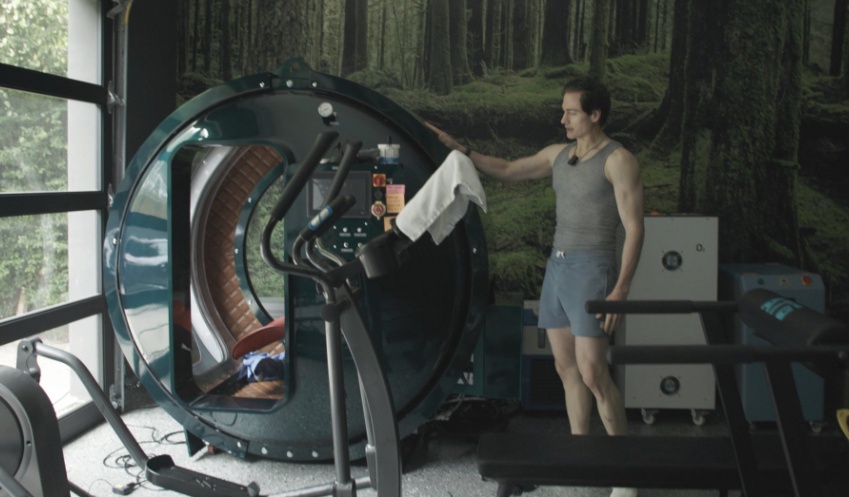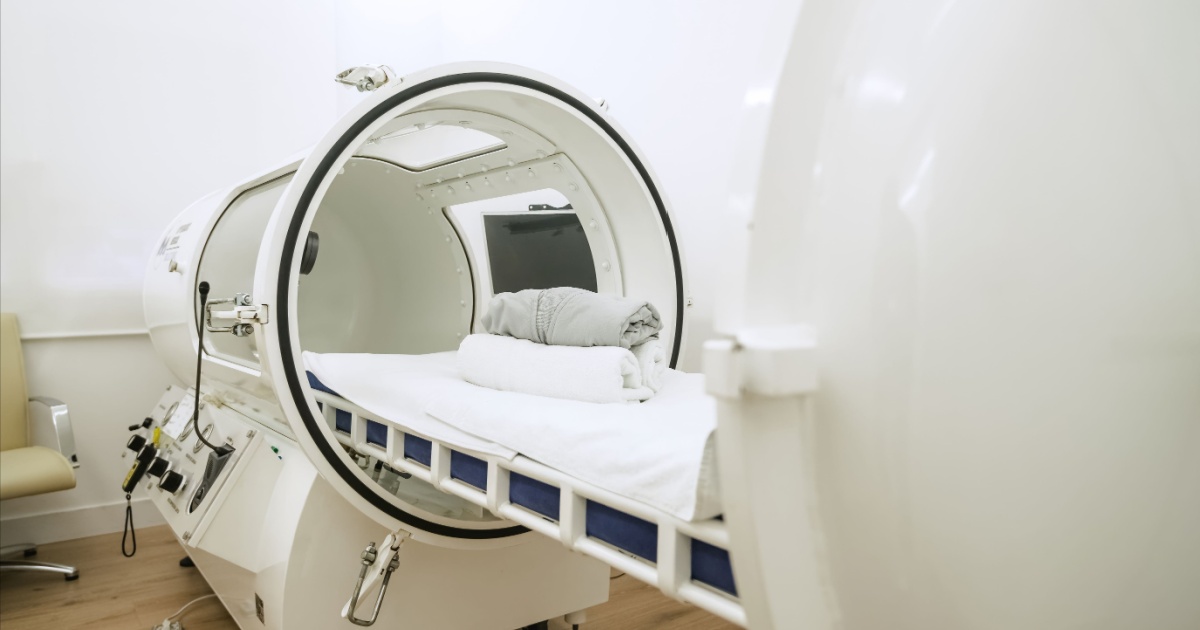When someone says Bryan Johnson, you may or may not be able to place where you’ve heard that name before. If someone says the guy doing crazy experiments like blood transfusions from his son to try and live forever, that may ring a few bells. A renowned entrepreneur and founder of a Silicon Valley venture fund, Johnson has been making waves with his push to try to decrease his biological age in a supposed attempt to live forever. He spends about $2 million per year on therapies, supplements, and everything in between to “biohack” the aging process of his own body. Recently, he completed a 90-day hyperbaric oxygen therapy course. This is what he claims it has done for him – and what this treatment actually is at all.
Understanding Hyperbaric Oxygen Therapy
Hyperbaric oxygen therapy involves breathing pure oxygen in a pressurized room or chamber. This increased pressure allows the lungs to gather more oxygen than would be possible breathing pure oxygen at normal air pressure. Proponents of this treatment believe that the higher oxygen levels in the body can promote healing, reduce inflammation, and potentially slow down the aging process. In his pursuit to stave off death, Johnson completed a 90-day experiment with this therapy that he claims to have given him the biology of a 10-year-old. Over 90 days, he underwent 60 intense oxygen therapy sessions. He says that they improved his skin, including a 10% reduction in UV damage, as well as a 300% growth in blood vessels, a 1000% increase in a specific gut microbe linked to metabolic and digestive health, and finally a 28% drop in biomarkers linked to Alzheimer’s disease.
Read More: Is Hyperbaric Oxygen Therapy the Key to Treating Fibromyalgia?
The Original Purpose of Oxygen Therapy
Oxygen therapy is not some brand-new technology – it is just relatively new in the anti-aging and longevity space. Originally, it was developed to address a wide array of medical conditions and illnesses that are characterized by inadequate oxygenation or respiratory distress. The goal of this treatment is to deliver supplemental oxygen to individuals experiencing hypoxemia, a condition marked by low oxygen levels in the blood. Some of the primary reasons for using oxygen therapy include acute respiratory failure, chronic obstructive pulmonary disease (COPD), asthma exacerbations, pneumonia, and respiratory distress syndrome in newborns. It is also a crucial part of managing conditions such as carbon monoxide poisoning, heart failure, and various surgical and critical care settings where patients need additional respiratory support. It provides the body with the necessary oxygen to meet cellular demands and maintain vital organ function while patients battle with various conditions.
More on Oxygen Therapy and Longevity

Read More: 3 Morning Supplements That May Help to ‘Slow Down’ Aging And ‘Promote Longevity
Through the induction of hyperoxic environments (aka environments that have higher oxygen concentration), HBOT has been found to aid in the prevention of cell senescence. This is the process of biological aging at a cellular level. This therapy promotes the expression of hypoxia-induced factors (HIF) and activates key mechanisms such as vascularization (the formation of blood vessels in tissues and organs) and angiogenesis (the formation of new blood vessels from pre-existing ones), thereby contributing to tissue regeneration and healing. Moreover, HBOT has exhibited significant effects on neuroplasticity, neurogenesis, and endogenous neural stem cell proliferation – all really scientific words pointing towards its potential at combating neurodegeneration, therefore decreasing risk of dementia. Furthermore, the regenerative benefits of HBOT extend to wound healing as well as improving the health of your actual cells themselves. Put that all together, and HBOT certainly has some potential to decrease signs of aging and increase longevity.
An Immune System Boost?
HBOT doesn’t only appear to have potential benefits in anti-aging and longevity, but in immune health, as well. It appears to amplify the body’s natural immune response and strengthen tissue integrity. Its elevated oxygen supply supports the process of collagen synthesis, which is critical for maintaining the strength and flexibility of tissues. This doesn’t just include the skin, but also the bones and tendons as well. This accelerated collagen synthesis encourages tissue regeneration and repair, meaning that it can tackle the signs of aging, as well as any marks and scars you may have on your skin. Additionally, the therapy has been observed to yield positive effects on cardiac, respiratory, and liver functions, along with improvements in urological conditions and cognitive functions typically associated with aging.
This all sounds like we’ve found the secret to anti-aging and living forever (or at least, for longer). It is not so simple, however. More research is needed to fully understand the mechanisms and potential utilization of HBOT, as well as to understand if and what the drawbacks may be.
Read More: Why These Two Common Vitamin Supplements Could Be Doing You More Harm Than Good
A Decrease in Oxygen To Achieve Longevity?

All of this talk about hyper-oxygenation and longevity, and yet there is actually evidence that the opposite could also contribute. A study from Harvard Medical School suggests an intriguing relationship between decreased oxygen levelsdecreased oxygen levels and enhanced longevity. Researchers studied a specific breed of mice that have abnormally short lifespans in a low-oxygen environment. It was the equivalent of the oxygen levels at Everest Base Camp. The mice lived 50% longer than expected in the low-oxygen environment. This adds to a growing body of evidence that oxygen restriction actually may hold a key to extending lifespan and preserving neurological function in animal models.
Some of the behaviors that the scientists observed in the mice were surprising. Despite expectations that the oxygen-restricted mice would consume less food, they actually ate slightly more. While the exact mechanisms responsible for the life-extending effects of oxygen restriction remain to be fully understood, the study’s findings have sparked interest in further exploration. While we don’t have data on humans just yet, the results are incredibly intriguing.
The Bottom Line

Bryan Johnson is certainly someone obsessed with understanding better what ages the human body and how to reverse it. Whether it is just a multi-millionaire’s version of an intense mid-life crisis or he actually just doesn’t want to die, there is potential for us all to learn from his seemingly crazy experiences. While hyperbaric oxygen therapy is definitely not something that is readily available for the average person, it is interesting nonetheless. Maybe it will lead to a better understanding of the human body, how it ages, and things we can do to live better for longer.
Read More: 6 Things That Will Happen to You If You Eat Blueberries Daily, According to a Dietitian

